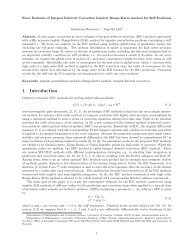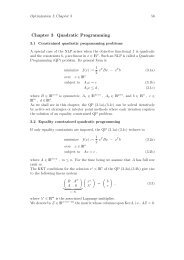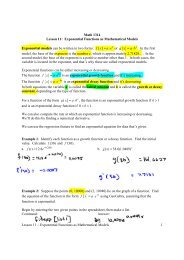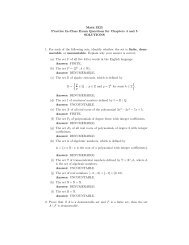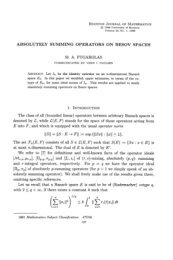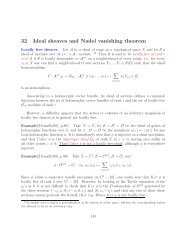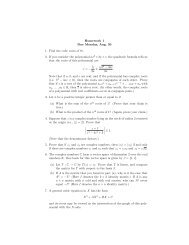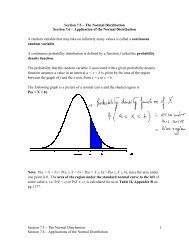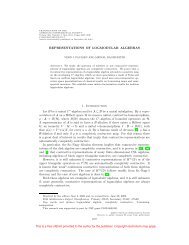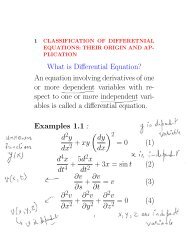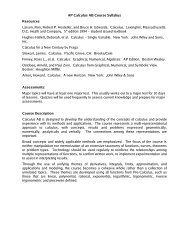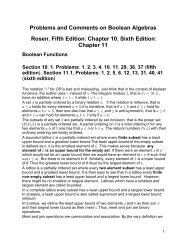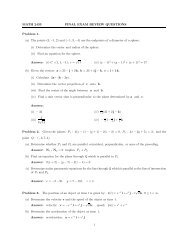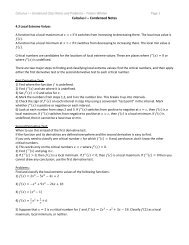Survey 1979: Equational Logic - Department of Mathematics ...
Survey 1979: Equational Logic - Department of Mathematics ...
Survey 1979: Equational Logic - Department of Mathematics ...
You also want an ePaper? Increase the reach of your titles
YUMPU automatically turns print PDFs into web optimized ePapers that Google loves.
WALTER TAYLOR 45<br />
has an influence on the fine spectrum (cf. 14.2) - see [424, pages 285-6]. For the<br />
closely related subject <strong>of</strong> "cancellation," see Lova'sz [262].<br />
14.11. Universal varieties. We must refer the reader to the papers [359], [361]<br />
<strong>of</strong> Pigozzi for this relatively new notion which promises to be quite important. F is<br />
universal iff for every similarity type there exist F-terms o t corresponding to the<br />
operations <strong>of</strong> this type such that for each A <strong>of</strong> this type there exists B C F such that A<br />
is a subalgebra <strong>of</strong> (B; FBt)tC T and (B; FBt)t T obeys exactly the same laws as A. (E.g.,<br />
the variety <strong>of</strong> quasigroups is universal.) Many <strong>of</strong> the undecidability and<br />
lattice-theoretic results <strong>of</strong> õ õ 12,13 above extend to universal varieties.<br />
14.12. The Schreier property (all subalgebras <strong>of</strong> free algebras are free) is<br />
investigated in Meskin [311], Kelenson [243], Aust [8], Jeek [210] and Budkin<br />
[71]; cf. 12.8 above. Neumann and Wiegold (supplementary bibliography) showed<br />
that the only Schreier varieties <strong>of</strong> groups are all groups, all Abelian groups, and all<br />
Abelian groups <strong>of</strong> exponent p (prime). (Schreier earlier proved that the variety <strong>of</strong> all<br />
groups has this property.) T. Evans gave a parallel result for semigroups (see<br />
supplementary bibliography).<br />
15. Malcev conditions and congruence identities. Malcev proved [278] that a<br />
variety F has permutable congruences iff there is a ternary term p(x,y,z) such that<br />
F p(x,x,y) = p(y,x,x) = y.<br />
(For binary relations , k, define - k = (a,c): there exists b(a,b) and (b,c) k<br />
and say that F has permutable congruences iff - b = ' for all congruences on any<br />
A F.) B. J6nsson proved [221 ] that all congruence lattices <strong>of</strong> algebras in F obey the<br />
distributive law iff there exist ternary terms Pi(x,y,z) (0 in) such that the<br />
following equations hold identically in F:<br />
Pi(x,y,x) = x (0 i n)<br />
P0(x,y,z) = x pn!X,y,z) = z<br />
Pi(X,X,y) = Pi+ 1 (x,x,y) (i even)<br />
Pi(x,y,y) = Pi+l(x,y,y) (i odd).<br />
(But cf. 12.10 above.) And Day [98] proved a similar result for modularity <strong>of</strong> the<br />
congruence lattice. ,Properties <strong>of</strong> varieties definable in this way by the existence <strong>of</strong><br />
terms have come to be known as Malcev-definable (see [420], [333] or [26] for a



